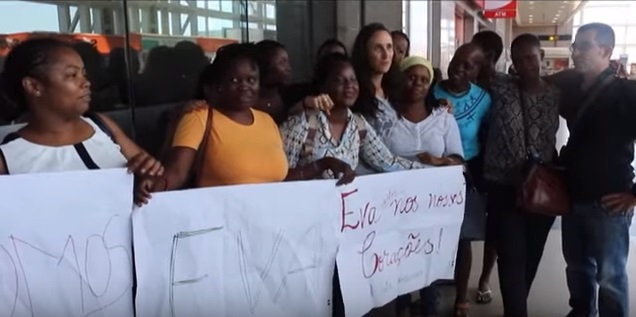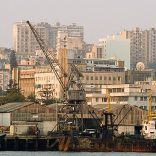Mozambique: Prime Minister calls for respect for human rights in prisons
Expulsion of Eva Moreno from Mozambique contested by lawyers and attorneys

Still image from the Africa News TV chanell report showing Mozambican activists saying goodbye to their Spanish colleague. Eva Anadon Moreno is the fifth from the left. The sin reads 'Eva in our hearts.
The Mozambican police on Wednesday expelled from the country a Spanish women’s rights activist, Eva Moreno, in defiance of the Maputo branch of the Attorney-General’s Office which ordered the deportation halted.
The deportation order, dated 28 March, was signed by Interior Minister Basilio Monteiro. It said that Moreno had violated her status as a foreign resident “by involving herself actively, openly and publicly in an illegal demonstration”.
This demonstration, on 18 March, was coordinated by the Women’s Forum, a coalition of Mozambican women’s organisations, in protest against the violation of the rights of women and girls in the country’s education system.
The immediate spark that lit this particular flame was a decision to ban girls from wearing mini-skirts in Mozambican schools. What angered the Women’s Forum was not the idea that schools should have a dress code, but the frequent claim that men harass or rape girls because of the way they dress.
The demonstration, in front of a Maputo secondary school, was to have taken the form of reading out a press release and performing a piece of street theatre. This did not happen, because the police intervened to break up the demonstration, briefly detaining five of the women, including Eva Moreno. They were released later in the day.
Under the legislation governing freedom of assembly, peaceful demonstrations do not require any authorization. But the organizers must notify the relevant authorities (the Maputo City Council and the police) four days in advance. The Women’s Forum failed to do this, and hence the demonstration was described as illegal.
Ten days after the aborted demonstration, Monteiro ordered Moreno’s deportation. According to her lawyer, Lauridos Saraiva, the first she knew of this was a summons to the immigration police. She was told that she would be taken to the National Immigration Directorate, but the real destination tuned out to be Maputo International Airport.
“In Mozambique nobody can be detained without a warrant, but Eva Moreno was held, or detained, for more than 12 hours”, said Saraiva, quoted by the independent daily “O Pais”.
Nobody showed Moreno’s lawyers any warrant. The police merely said “we have received higher orders”. When it became clear that Moreno was to be deported, the lawyers asked again for a warrant or a dispatch, but none was forthcoming. So they appealed to the Maputo branch of the Attorney-General’s Office to halt the deportation.
Maputo attorney Benedito Langa went to the airport and ordered the police to release Moreno. An amateur video shot at the airport, and later shown by the independent television station STV, showed the policeman on duty, not only disobeying Langa, but manhandling her, pushing her away.
He declared that nobody would leave the airport because he had orders from the Minister of the Interior. He then telephoned the Ministry, and claimed that he received orders to detain, not only Moreno, but also Langa. Moreno was deported, and Langa was only released after the intervention of the Maputo chief attorney, who had to go personally to the airport.
The chairperson of the Association of Attorneys of the Public Prosecutor’s Office, Nelia Correia, was outraged by the police action. She pointing out that Langa had just been doing her job, upholding legality. She had demanded the release of Moreno, because the police could show no document that legitimized her detention.
The disobedience shown by the airport police, said Correia, was “a lack of respect” for the independence of Langa’s office. As for Langa’s subsequent detention “I would like to know what law is in force in this country which gives a Minister, an agent of the executive, the power to arrest an Attorney?”
If this was the way the police acted towards an attorney, how did they act towards ordinary members of the public?, Correia asked.
As for Monteiro’s dispatch, Correia pointed out that Moreno was not given any opportunity to appeal. There was no proper notification of Moreno herself or of the Spanish embassy. The rules imposed by the legal diploma governing the administrative expulsion of foreign citizens were not followed. Correia thus regarded the Minister’s dispatch as null and void.
Saraiva pointed out that the demonstration also included Mozambicans. “What’s happened to them?”, he asked. “Why has only the foreigner been sentenced? This is discrimination and a violation of the constitution”.
The Attorney-General’s Office (PGR) has now ordered an inquiry into the expulsion of Moreno. A release from the PGR noted that when an attorney (Langa) tried to check the legality of the deportation, she was not shown any document justifying the detention and expulsion. The report from the enquiry must be presented within five days.
On Thursday the Spanish government summoned the Mozambican ambassador in Madrid to explain the expulsion of Moreno. The Spanish online daily “El Espanol” said that the Spanish Foreign Ministry has also requested written information on the incident from the Mozambican authorities.
One of the most respected figures in the Mozambican legal system, retired Supreme Court judge Joao Carlos Trindade, in a lengthy post on his Facebook page, said that the failure to notify Moreno of the Minister’s dispatch was a serious violation of “an essential formality”. He pointed out that, although she is now in Spain, Moreno still has the right to appeal against her deportation to the Mozambican Administrative Tribunal.













Leave a Reply
Be the First to Comment!
You must be logged in to post a comment.
You must be logged in to post a comment.